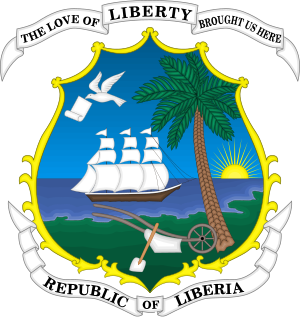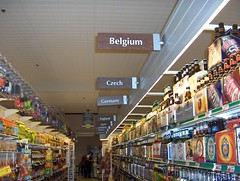 Image via Wikipedia
Image via Wikipedia
Introduction
Contrary to global socio-economic expectations, the West African state of Liberia has been slowly capitalizing on the growing and unique human interaction and interconnectedness sweeping the world in the name of globalization. Decades of recurring civil wars, coup d’états, endemic corruption, environmental pollution, and protracted insecurity has made Liberia a laughing stork in a world experiencing tremendous economic globalization. Despite Liberia’s proximity to the United States in terms of culture, politics, and history and despite Liberia containing abundant exploited and unexploited natural resources, the country has not achieved much in terms of economic globalization. The purpose of this paper is to shed light on how globalization has impacted the ecosystem of the said beleaguered, impoverished, and war-ravaged nation and how Multinational Corporations (MNCs) have been in the forefront of depleting, polluting, and imposing immeasurable strain on Liberia’s ecology in the absence of corporate social responsibility.
Liberia: International Membership
Liberia is party to the following International Agreements: Biodiversity, Climate Change, Climate Change-Kyoto Protocol, Desertification, Endangered Species, Hazardous Wastes, Ozone Layer Protection, Ship Pollution, Tropical Timber 83, Tropical Timber 94, and Wetlands. It has signed but not ratified the following agreements: Environmental Modification, Law of the Sea, and Marine Life Conservation.[1] The unemployment rate of Liberia is 85%; population below poverty line is 80%; as of December 2008, commercial bank prime lending rate stood at 14.4%; inflation rate (consumer prices) stood at 11.2% (2007); as of 2006 Liberia’s estimated exports was $1.197 billion while estimated imports was $7.143 billion for the same year. [2]
Definition of Globalization
John Baylis, in his book
The Globalization of World Politics, defines globalization as: “a historical process involving a fundamental shift or transformation in the spatial scale of human social organization that links distant communities and expands the reach of power relations across regions and continents.” [3] Said other way, globalization is the collective integration of political, economical, and cultural efforts across the globe. It emphasizes and incorporates trade and technology, health and culture, environment and migration, investment, banking and money issues, development and gender issues, international law and organizations, energy, human rights, global education, and global media. While globalization has been applauded in different regions as a strong allocator of resources, distrust and indecision to grasp its benefits has left many Third World nations including Liberia lagging behind in the field of economic globalization. There are very few Multinational Corporations (MNCs) in Liberia. One such notable MNC is the Firestone Corporation. “Multinational Corporations are private, for-profit organizations that have commercial operations and subsidiaries in two or more countries.” [4] MNCs may be headquartered in one country but have subsidiaries in secondary countries. MNCs retain ownership of and managerial control over subsidiaries while producing goods and services for the world markets at the least possible cost. [5]
Rubber Introduction and Production
Rubber was introduced to Liberia from South America in 1900s with Bridgestone, a Japanese company-the parent company of Firestone-owning the largest rubber plantation. The first large-scale rubber plantation was started in 1906, when American industrialist, Harvey Firestone started 118,000 acre (48,000 ha.) concession some 50 kilometers east of the Liberian capital Monrovia. Despite being owned by Bridgestone, Firestone has it’s headquarter in Nashville, Tennessee. In total, there are seven major rubber tapping companies in Liberia, namely: Firestone, Liberia Agricultural Company (LAC), Guthrie, Liberia Company (LIBCO), Salala Rubber Corporation, Cavalla and Sinoe Rubber Corporation (SRC). According to a 2002 IMF report, Liberian rubber exports were estimated at 54.7 million USD with rubber production accounting for 99,569 tons for the same period. [6] Even though rubber is a source of immense wealth for Liberia, persistent corruption undermines the equitable distribution of resources. A comprehensive report produced by a joint publication of Partnership Africa Canada (PAC) and the Association of Environmental Lawyers of Liberia (Green Advocates) states: “Firestone, after all, has been extracting rubber from Liberia for over 70 years, and has so far not manufactured so much as a single rubber band in the country.” [7] There have been widespread manipulations of the economy of Liberia by the rubber producing sector. This is stipulated in a comprehensive produced by UNMIL. “In May 2006, the UNMIL Human Rights and Protection Section (HRPS) studied Liberia’s rubber sector and published a series of key findings and recommendations pertaining to the sector. 66 Issues that it examined included human rights concerns pertaining to the industry; post-conflict business practices and corruption; the status of and role of commercial rubber concession and management agreements; worker, child, and community rights; implications of plantation agriculture and sectoral industrial practices for the environment; and the rule of law within the rubber sector, including issues relating to ex-combatant occupation of plantations.” [8] According to UNMIL reports, labor disputes with rubber conglomerations remain a security concern for the government of Liberia (GOL).
Negative Implication of Globalization
The interaction of plants, animals, and other organisms with the environment is defined as an ecosystem and may include deserts, grasslands, tundra, deciduous forests, and tropical rain forests. Any form of alteration in the ecosystem like logging, slash-and-burn, soil erosion, insect infestations, desertification, and desertization usually results in environmental depletion and ecological degradations. Scientifically, pollution is defined as “an undesirable change in the physical, chemical or biological characteristics of air, water, soil, or food that can adversely affect the health, survival, or activities of humans or other living organisms.” [9] The refusal by some developed countries to ratify the Kyoto Protocol has raised wild condemnations. Environmental scientists have come up with what they refer to as “
Pollution Haven Hypothesis” which will allow China and India to be exempt from emission caps because of the United States’ refusal to ratify the Kyoto Protocol. On the other hand, because of this exemption, domestic industries will head to China and India. “A common criticism is that advanced economies have often moved their more dirty industries to other parts of the world where there are less stringent environmental and social standards. As a result, other countries may be polluting on their behalf…” [10]
Current environmental issues for Liberia include tropical rain forest deforestation; soil erosion; loss of biodiversity; pollution of coastal waters from oil residue and raw sewage. Often, MNCs have been accused of practicing varying forms of exploitations: manipulation of child labor and environmental degradations in regions governed by corrupt regimes where laws are lax and ineffective. [11] Reports abound of workers suffering untold health hazards while perilously toiling extended hours in poor conditions. Liberia’s European-owned timber industries have been implicated in illegal arms trafficking. According to a 2003 report, arms shipments destined for Charles Taylor arrived at ports controlled by the timber industry. The report further affirms that arms shipments arrived from Eastern Europe every two to three weeks via Nigeria and Libya before being dispatched to their right destinations to wreck havoc on peaceful civilian populations. “The government’s timber policy ignored international logging restrictions by permitting timber companies to clear-cut large expanses of protected West African rain forest."[ 12] The departure of Charles has left Liberia in a state where the current central government under Ellen Johnson Sirleaf still remains confounded by traces of corruption and environmental pilfering. Usually, it takes many years for any nation to recover from such gross human miscalculations.
In Liberia, employers are not mandated by law to provide their employees with certain benefits such as medical, paid vacation, sick leave, and unemployment benefits that are enforced in the west. Working in concert with successive regimes that were unsympathetic to defenseless civilians, Firestone and like corporations meticulously depleted the Liberian ecosystem through pollution, destruction of fauna and flora, and the practice of negative externalities. Employees of Firestone have consistently complained about Firestone’s indiscriminate dumping of toxic wastes into the riverways adjacent to the plantations owned by Firestone without considering the consequences these chemicals may have on the workers’ health. Workers complained of exposure to pesticides, formaldehyde, and toxic fumes from ammonium nitrate during rubber processing. With a meager wage of USD 3.19 a day, workers, oftentimes, with the help of their children, have to work 21 exhausting hours a day, to tap 1,000 trees.[13]
In the past, Bridgestone/Firestone sponsored the Super Bowl with the goal of showcasing its brands to 1 billion viewers around the world. Ironically, NFL Commissioner Roger Goodell, who in the past closed his eyes to the actions of Bridgestone/Firestone by allowing it to be a sponsor of the NFL, is a board member of Action for Healthy Kids. An organization whose goal is to fight the causes of obesity and undernourishment in children, the vision of
Action for Healthy Kids is to ensure “all kids develop the lifelong habits necessary to promote health and learning.
Positive Implication of Globalization
Despite globalization integrating capital, technology, and information across national borders, tensions exist between the globalization system and ancient forces of culture, geography, tradition, and community. Before the outbreak of the civil in 1989, Liberia was the leading producer of Iron ore in Africa with sizable deposits found in the Bomi Hills, the Bong Range, the Mano Hills, and Mount Nimba, where the largest deposits occur. Other minerals include diamonds, gold, lead, manganese, graphite, cyanite (a silicate of aluminum, with thin bladelike crystals), and barite. With increased hardwood timber production, Coffee and Cacao cultivation, Liberia has seen substantial increase in the number of foreign corporations settling in the country. Just like its neighbor Sierra Leone, the abundance of uncut diamonds necessitated the spread of
“blood” or ‘conflict” diamonds, consequently prompting the UN to impose a ban in 2001. Under the auspices of the Kimberley Process Certification Scheme, an international program that ensures that the rough diamonds trade does not finance armed conflict, diamond mining resumed in 2007 with the blessings of the UN.
The registration of foreign merchant ships under the Liberian “
flag of convenience” has made Liberia one of the world's leading countries in registered shipping tonnage second after Panama. The announcement by President George W. Bush on May 31, 2003 of the Proliferation Security Initiative (PSI) saw Liberia sign sea boarding agreement on February 11, 2004 which gives either one of parties to this agreement the right to board, search, and if possible detain any ship found to be harboring suspicious cargo. Such initiatives have given Liberia, Panama and other nations that are party to the PSI the obligation to bring about greater self-assurance in their flag registry. With ongoing deepwater oil exploration along the Atlantic coast, the prospect of tapping into black gold has so far not diminished. The presence of the United Nations Mission in Liberia (UNMIL) preceded by contingents from the Economic Cooperation of West African States (ECOWAS), the implosion of shipping lanes, the interaction of Liberians with the United States and the European Union (EU) through commerce, migration, and education and their mutual relationship with Asian countries like China, South Korea, and Japan through trade imports, and the elimination of policy barriers to trade and investment, have intensified economic globalization.
Income Inequalities
Attributing globalization to the demise of the poor is a misguided notion. With the exception of a few global leaders with futile beliefs towards globalization, many nations-especially developed ones-remain convinced that globalization does more good than harm to the poor. Those leaders opposed to globalization have the penchant to hold back the four components that are a forerunner for growth and development: economic integration, technology, political engagement, and personal contacts. Trade, Foreign Direct Investments, capital inflows and outflows, and net factor income are the determining factors in economic integration. Critics of globalization are of the opinion that globalization has brought rising inequality and poverty. Another downbeat argument by some writers or scholars is that MNCs significantly change the infrastructure of host countries and at the same time alters the culture and tradition of the locals they encounter.
Conclusion
Even though the cultural and environmental quandaries created by foreign-based transnational corporations like Firestone may seem disastrously discombobulating at first glance for any concerned environmentalist, the strengthening of the global environmental agency UNEP and the reinforcement of Liberia’s EPA could place a cap on further destruction of Liberia’s cultures, traditions, and the environment not only for the present but for posterity. As long as Firestone-Liberia and other multinational or transnational corporations operating in Liberia abide by the internationally recognized environmental standards management set forth by ISO 14000, there shouldn’t be any problem for it operating from far a field in any developing country including Liberia.
Endnotes
[1] Liberia: African Development Bank-World Bank Joint Assistance Strategy, 2008-2011 and Eligibility to the Fragile States Facility http://www.afdb.org/fileadmin/uploads/afdb/Documents/Project-and-Operations/Liberia_%20JAS%20BAD-WB%202008-2011%20Eligibility%20to%20the%20Fragile%20States%20Facility.pdf
(Accessed July 16, 2010)
[2] Liberia Economy 2010, CIA World Factbook,
http://www.theodora.com/wfbcurrent/liberia/liberia_economy.html
(Accessed July 16, 2010)
[3] John Baylis et al., The Globalization of World Politics: An Introduction to International Relations (4e), Oxford University Press, Great Clarendon Street, Oxford ox2 6DP (P19)
[4] Kelly-Kate S. Pease, International Organizations, Perspectives on Governance in the Twenty-First Century (3rd. ed.), Pearson Education, Inc., Upper Saddle River, New Jersey 07458
[5] Gilpin, Robert, The Political Economy of International Relations, Princeton University Press, Princeton, NJ, 1987
[6] United Nations Mission in Liberia (UNMIL), Human Rights in Liberia’s Rubber Plantations: Tapping into the Future (May 2006)
http://www.laborrights.org/files/UN%20Liberia%20Rubber%20Report-%20%20May%202006.pdf
(Accessed July 16, 2010)
[7] Land Grabbing and Land Reform: Diamonds, Rubber and Forests in the New Liberia
http://www.pacweb.org/Documents/diamonds_KP/17_Liberia-Land-Grabbing-Reform_Jul2007.pdf
(Accessed July 16, 2010)
[8] Liberia's Post-War Development: Key Issues and U.S. Assistance by Nicolas Cook Specialist in African Affairs, May 19, 2010
http://www.fas.org/sgp/crs/row/RL33185.pdf
(Accessed July 25, 2010)
[9] G. Tyler Miller, Jr., Sustaining the Earth: An Integrated Approach, Thomson Higher Education, 10 Davis Drive, Belmont, CA 94002-3098
[10] Corporate Social Responsibility by Anup Shah, July 07, 2007
http://www.globalissues.org/article/723/corporate-socialresponsibility#Rankingcountriesontheircommitmentstocorporatesocialresponsibility
(Accessed July 16, 2010)
[11] Firestone in Liberia ‘pollution’-BBC News, Oct 29, 2009
http://www.stopfirestone.org/2009/10/firestone-in-liberia-pollution-bbc-news/
(Accessed December 3, 2010)
[12] Nations Hospitable to Organized Crime and Terrorism, Library of Congress-Federal Research Division, October 2003
(Accessed July 24, 2010)
http://www.fas.org/irp/cia/product/frd1003.pdf
[13] Emira Woods, Modern-Day Slavery and the Big Game February 3, 2008,
http://www.alternet.org/economy/75824/
(Accessed July 16, 2010)
Bibliography
96025: Liberia: Issues for the United States by Carl EK, Foreign Affairs and National Defense Division, updated November 21, 1996
Retrieved July 17, 2010 from
http://www.fas.org/man/crs/96-025htm
Liberia: African Development Bank-World Bank Joint Assistance Strategy, 2008-2011 and Eligibility to the Fragile States Facility ,
Retrieved July 16, 2010 from http://www.afdb.org/fileadmin/uploads/afdb/Documents/Project-and-Operations/Liberia_%20JAS%20BAD-WB%202008-2011%20Eligibility%20to%20the%20Fragile%20States%20Facility.pdf
Liberia Economy 2010, CIA World Factbook,
Retrieved July 16, 2010 from
http://www.theodora.com/wfbcurrent/liberia/liberia_economy.html
John Baylis et al., The Globalization of World Politics: An Introduction to International Relations (4e), Oxford University Press, Great Clarendon Street, Oxford ox2 6DP (P19)
Gilpin, Robert, The Political Economy of International Relations, Princeton University Press, Princeton, NJ, 1987
United Nations Mission in Liberia (UNMIL), Human Rights in Liberia’s Rubber Plantations: Tapping into the Future (May 2006),
Retrieved July 16, 2010, from
http://www.laborrights.org/files/UN%20Liberia%20Rubber%20Report-%20%20May%202006.pdf
Kelly-Kate S. Pease, International Organizations, Perspectives on Governance in the Twenty-First Century (3rd ed.), Pearson Education, Inc., Upper Saddle River, New Jersey 07458
Land Grabbing and Land Reform: Diamonds, Rubber and Forests in the New Liberia,
Retrieved July 16, 2010 from
http://www.pacweb.org/Documents/diamonds_KP/17_Liberia-Land-Grabbing-Reform_Jul2007.pdf
G. Tyler Miller, Jr., Sustaining the Earth: An Integrated Approach, Thomson Higher Education, 10 Davis Drive, Belmont, CA 94002-3098
Corporate Social Responsibility by Anup Shah, July 07, 2007,
Retrieved July 16, 2010 from
http://www.globalissues.org/article/723/corporate-socialresponsibility#Rankingcountriesontheircommitmentstocorporatesocialresponsibility
Firestone in Liberia ‘pollution’-BBC News, Oct 29, 2009,
Retrieved July, 16, 2010 from
http://www.stopfirestone.org/2009/10/firestone-in-liberia-pollution-bbc-news/
Tarnue Johnson, Ethics and business development in Liberia: The case of Firestone Natural Rubber Company, Tuesday, 25 August 2009,
Retrieved July 16, 2010 from
http://www.liberianforum.com/Academic-Papers/Ethics-and-business-development-in-Liberia.html
Emira Woods, Modern-Day Slavery and the Big Game, February 3, 2008,
Retrieved July 16, 2010 from
http://www.alternet.org/economy/75824/
 Africa, my dream. (Photo credit: MadalenaPestana)
Africa, my dream. (Photo credit: MadalenaPestana)












